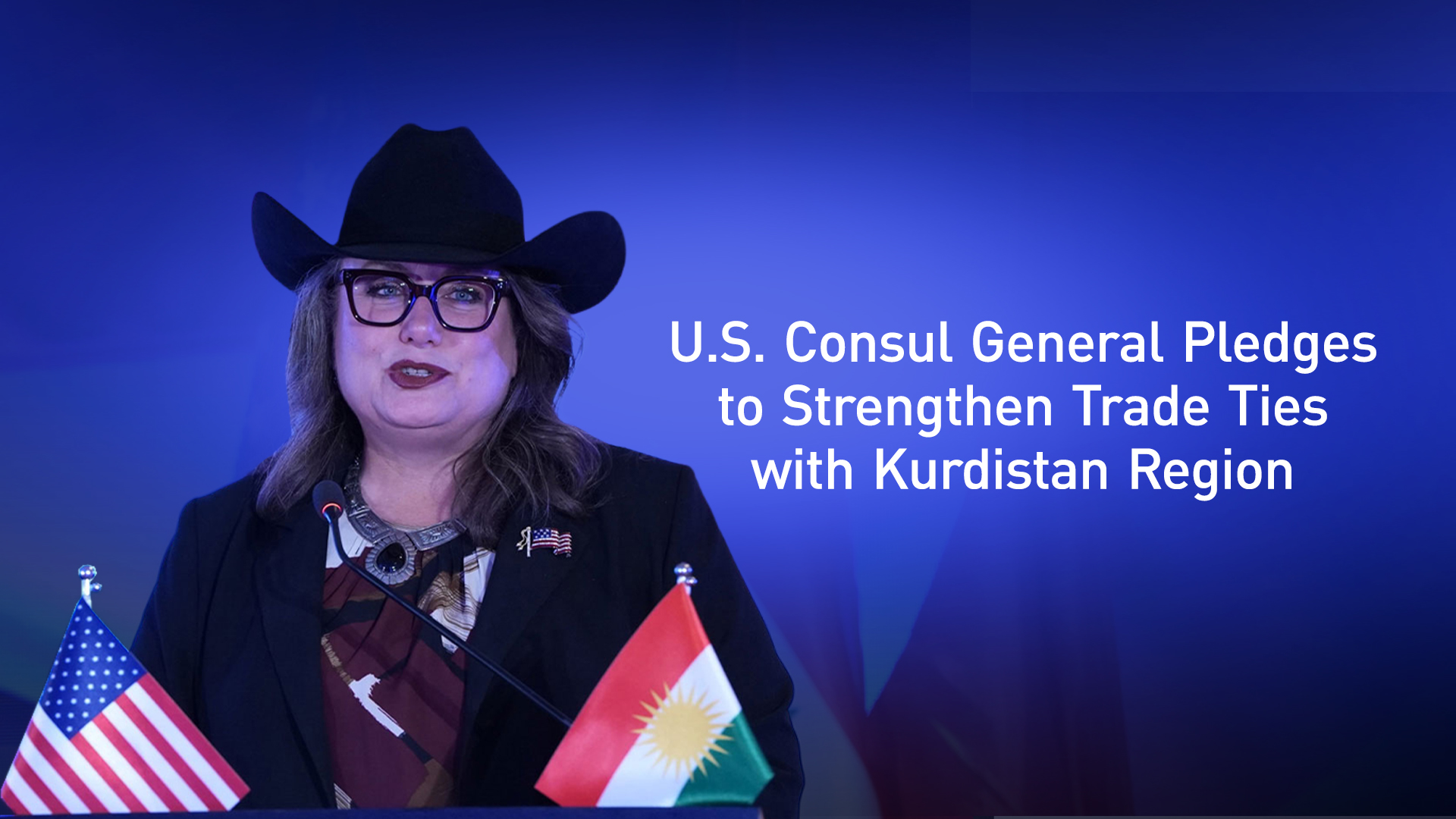U.S. Consul General Pledges to Strengthen Trade Ties with Kurdistan Region
The time has come to build our partnership on trade, not just security, U.S. Consul General Wendy Green tells the Erbil conference

ERBIL (Kurdistan24) — U.S. Consul General in Erbil Wendy Green on Monday reaffirmed Washington’s commitment to expand trade and investment relations with the Kurdistan Region, stressing that future cooperation should increasingly focus on the economic sector rather than solely on security.
Speaking at the Kurdistan Regional Government’s (KRG) Economic and Trade Cooperation Conference, which brought together Kurdish and American officials, investors, and business leaders in Erbil on Sept. 8, 2025, Green said she was encouraged by the growing interest of U.S. companies in the region.
“One of my dreams was to see American traders and investors partnering with Kurds in the field of commerce,” she said, adding that the Kurdistan Region has demonstrated strong support for American enterprises.
She noted that while past cooperation had centered largely on security, the time had come to “lay the foundations of trade partnership.” Green added that she has met with senior KRG officials, toured various areas of the region, and spoken with academics and entrepreneurs, many of whom asked about the next steps in U.S.-Kurdistan ties. “My answer was: trade,” she emphasized. U.S. President Donald Trump also reiterated this vision, according to Green, who argued that trade partnerships would make bilateral relations stronger and more sustainable.
The U.S. Consul General highlighted sectors such as energy, education, and healthcare as promising areas for American companies to invest in.
“We want to bring more U.S. companies to Kurdistan and strengthen our commercial ties,” she said, adding that addressing existing challenges would be key to realizing the full potential of the relationship.
Green acknowledged that alongside opportunities, obstacles to investment remain, but said platforms like Monday’s conference could help provide solutions and foster greater economic engagement.
“By overcoming challenges, both Kurdistan and the U.S. will benefit,” she concluded.
The Kurdistan Region’s Interior Minister, Rebar Ahmed, who also addressed the conference, stressed the importance of further strengthening ties with the United States. He pointed out that Prime Minister Masrour Barzani’s recent visit to Washington had opened a new chapter in diplomacy and trade, sending a clear message that the Kurdistan Region is a reliable, stable, and secure destination for investment.
Ahmed emphasized that today’s discussions reaffirm the government’s vision of building strong and concrete partnerships with the United States and American businesses.
He went on to highlight the role of U.S. institutions in creating new opportunities in the Kurdistan Region, extending his appreciation to Steve Lutes, Vice President of the U.S. Chamber of Commerce, for supporting economic initiatives. Ahmed also commended U.S. Consul General Wendy Green and her team for their contribution to strengthening bilateral ties.
He underlined that ensuring domestic stability through the police, civil defense, border security, and rapid crisis response remains a top government priority to preserve investor confidence. At the same time, he warned that ISIS continues to pose threats in certain disputed areas and that militia attacks targeting Kurdistan’s infrastructure risk undermining stability.
For this reason, he stressed, coordination with U.S. partners in security, technology, and infrastructure protection is indispensable.
The relationship between the Kurdistan Region and the United States has deep roots, shaped by decades of political, security, and humanitarian engagement. Since the 1991 Gulf War, when U.S.-led coalition forces enforced a no-fly zone to protect Kurdish civilians from Saddam Hussein’s regime, Washington has played a central role in the region’s security and political trajectory.
The establishment of the Kurdistan Regional Government in 1992 coincided with a period of close U.S. support for Kurdish autonomy within Iraq.
Following the 2003 U.S.-led Freedom Operation of Iraq, Kurdish forces, the Peshmerga, emerged as vital American allies in stabilizing northern Iraq. This partnership deepened during the war against ISIS (2014–2017), when U.S. military support was crucial in enabling the Peshmerga to hold back and eventually defeat the extremist group alongside coalition forces.
Beyond security, however, economic cooperation has become an increasingly important pillar of bilateral ties. American companies, particularly in the oil and gas sector, have invested heavily in the Kurdistan Region, seeing it as a gateway to broader opportunities in Iraq and the Middle East.
U.S. officials, meanwhile, have repeatedly encouraged the KRG to diversify its economy beyond hydrocarbons, citing potential in areas such as agriculture, education, health, and digital technology.
The U.S. has also supported governance reforms, institution-building, and private-sector development in Kurdistan, aiming to help create a stable and business-friendly environment. While political disputes between Erbil and Baghdad have sometimes complicated the investment climate, Washington has often acted as a mediator, encouraging compromise and long-term cooperation.
For many Kurdish leaders, strengthening ties with the U.S. represents not only an economic opportunity but also a strategic safeguard amid regional instability and shifting alliances.
Monday’s conference in Erbil reflects this evolving vision: moving from a relationship defined primarily by military and political cooperation toward one grounded in sustainable economic partnership.